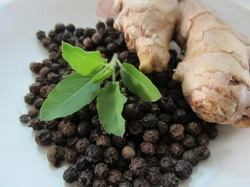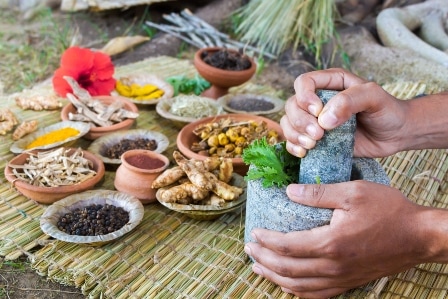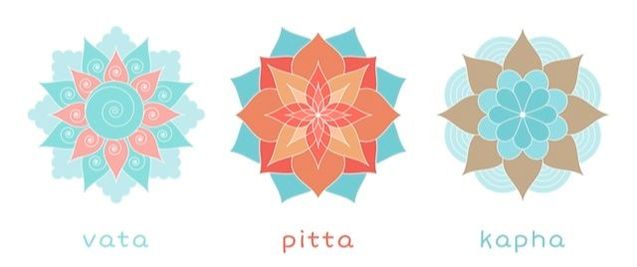Ayurveda
|
Ayurveda is a Traditional System of Medicine (TSM), recognised as such by the World Health Organisation (WHO). It originated in India and is today widely practised in India and Sri Lanka as a government-recognised and statutorily regulated medical system.
It is a comprehensive medical system with classical specialist branches that include internal medicine, ENT, ophthalmology, gynaecology, obstetrics, paediatrics, surgery, psychology and rejuvenation therapy. The term Ayurveda is derived from two Sanskrit words, ayus (meaning life) and vid (meaning knowledge). Ayurveda is thus the 'science of life', and it is as much concerned with preventing ill-health and enhancing quality of life as it is with the actual treatment of disease. Ayurveda recognises the dynamic interplay of the physical, mental, emotional and spiritual levels in every individual. |

Ayurveda is embedded in Indian philosophy according to which the universe is composed of five basic elements. These are ether, air, fire, water and earth, which manifest as three doshas called vata, pitta and kapha which are the primary energetic forces of the human body. Vata is a combination of air and ether; pitta, a combination of fire and water and kapha, a combination of water and earth. In their balanced state the three doshas maintain the integrity of the living organism, conferring health and longevity. Any imbalance of these forces results in ill-health.
Ayurveda places particular emphasis on the individual constitution, prakriti, of every being, which is determined by a unique combination of doshas and genetic factors. Prakriti determines an individual's susceptibility to different diseases and has an influence on the development and course of a disease as well as on the complications that could arise and the prognosis.
An Ayurvedic practitioner takes a detailed case history and arrives at a diagnosis through a variety of methods, including pulse and tongue diagnosis. The skill of the practitioner lies in assessing a patient’s constitutional type, in diagnosing the root cause of imbalance that manifests as disease, and in selecting appropriate remedial interventions from an array of therapeutic options. These include:
Ayurveda places particular emphasis on the individual constitution, prakriti, of every being, which is determined by a unique combination of doshas and genetic factors. Prakriti determines an individual's susceptibility to different diseases and has an influence on the development and course of a disease as well as on the complications that could arise and the prognosis.
An Ayurvedic practitioner takes a detailed case history and arrives at a diagnosis through a variety of methods, including pulse and tongue diagnosis. The skill of the practitioner lies in assessing a patient’s constitutional type, in diagnosing the root cause of imbalance that manifests as disease, and in selecting appropriate remedial interventions from an array of therapeutic options. These include:
- nutrition and lifestyle therapy
- herbal medicine
- panchakarma (detoxification therapy): a series of treatments that aim at deep body cleansing.
- rasayana (rejuvenation therapy): various rejuvenating treatments that increase strength, immunity and overall vitality.
- manual therapy including massage and other forms of hands-on body work
- marma therapy (stimulation of energy points with pressure or needles)
- psychotherapy and counselling
- yoga and therapeutic exercise
- meditation and breathing techniques
Contact us: [email protected]

